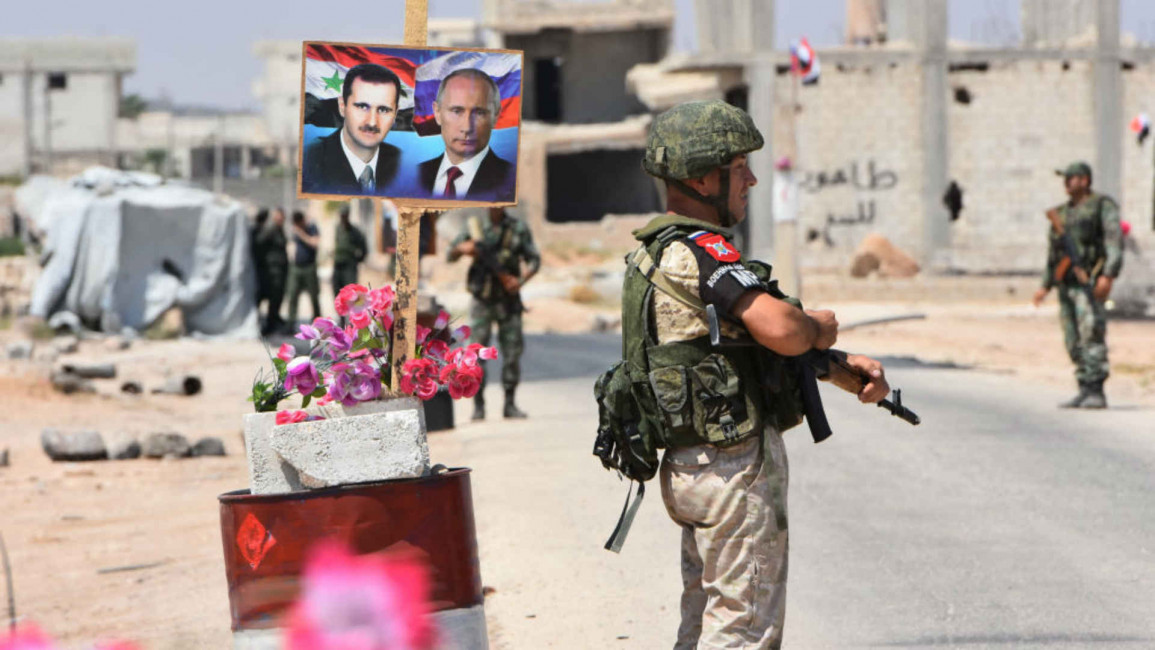
Appeasing Assad
At least 15 people were murdered, while residential areas were targeted and more Syrians joined the millions made homeless by Baathist-Russian bombs.
This might seems like a drop in the ocean, given the regime's actions over the past eight years, but the violence has a purpose. Its timing belies a predictable move from Russia and Assad's savage playbook. Every time western powers or any other influential group meets to discuss Syria's future without the involvement of the Assad axis, the bombs and bullets aren't far behind.
The general purpose is to undermine the terms of "peace conferences" before they can even be fully set. If Russia-Assad attacks rebel-held areas, they want to suck the rebels into retaliating, thus justifying further escalations in violence.
In days gone by, the motive for the Assad axis' objection to western/UN-led talks about the fate of Syria was obvious, given the consensus was that Assad leaving power was the main precondition for any negotiations between the opposition and pro-regime forces. But now those days are gone.
The new consensus of global powers, even if the precise details are not fully concrete, is that Assad can remain in power. In this sense, the violence from Russia-Assad over Brussels III is the actions of forces who are drunk on the blood of Syrians.
What was once the main aim of the Assad axis, namely ensuring Assad remains in power, has been achieved, but it's now not enough.
 |
The new consensus of global powers, even if the precise details are not fully concrete, is that Assad can remain in power |  |
History warns us very well that appeasement by its very nature only leads to a situation where the force being appeased wants more and more. Their main aim, once it has been achieved, swiftly turns into a more egregious demand, backed up by even more brutality.
With Brussels III, the main fears of Russia, Iran and Assad can be split roughly into two interrelated factors: Firstly, they fear Idlib will be effectively kept out of reach of Assad and have reconstruction funds allocated to it, and secondly, they fear those coveted UN, EU and western reconstruction funds will be used as a bargaining chip against Assad and Russia in order to impose a UN-crafted solution to the conflict.
This isn't good enough - Assad and his backers want to achieve the as yet elusive "total victory". This would mean the current rump state extending across the whole country, with cleansed populations allowing for Assad's new neo-colonial tyranny to be reinstituted with relative ease.
 |
|
| Syria Weekly is a new, regular feature from The New Arab. To get Syria Weekly in your inbox each week, sign up here |
The tonnes of bombs and missiles used by Assad and Russia on rebel-held or rebel-supporting civilian areas of Syria were all dropped for this express purpose - the genocidal will to reshape the demographics of Syria. Add into this nascent attempts by Iran at imposing sectarian gerrymandering on the cleansed populations and the plan is almost complete.
Almost, but not quite.
For while Russia and Iran might have been able to swoop in and spend billions in destroying Syria on behalf of Assad, they don't quite have enough in the coffers to rebuild the destroyed cityscapes and infrastructure. Such a process would cost perhaps hundreds of billions of dollars, so, like any force that has benefitted from appeasement, they expect the appeasers to pick up the bill.
Not that they haven't forged ahead with their own neo-colonial forms of "reconstruction", such as Iran's memorandum of understanding with Assad ensuring they have tight and lucrative control over various post-war economic relations.
Then there's the plan to utilise Syria for Iran's grand trade plan - in alliance with their authoritarian Islamophobic blood brothers in China - for a railway stretching from Iran through Iraq to Latakia.
Russia has initiated similar colonialist projects. Like a smaller version of the scramble for Africa - it's imperialism returned to its most acute form of exploitation and gangsterism.
 |
History warns us very well that appeasement by its very nature only leads to a situation where the force being appeased wants more and more |  |
This is not simply a continuation of the status quo of imperialism - it's a major regression or resurrection of the very worst era of imperial domination.
But the major coup would be - through exploiting the humanitarian crisis they have created and scaring xenophobic Europe by weaponising refugees - getting the West to pay for most of the reconstruction that Russia and Iran could then exploit.
However, the appeasers aren't quite willing to do that yet, not while Assad and his backers continue to carry out genocide, not when they starve, exterminate and persecute millions of Syrians.
It would be nice to think that once the appeasers have finally caved into allowing Assad to stay, they might preserve a streak of ethical defiance against letting him have his cake and eat it. But the reality is that they, especially the ever-racist EU, are truly only concerned with keeping Europe as white and non-Muslim as possible.
 |
|
| Russian airstrikes killed at least 13 civilians, including six children, on March 14 in Idlib province [AFP] |
Despite this, Idlib remains a thorn in Assad's side.
Though the province remains officially in a state of "demilitarisation", we've seen through the years that Assad-Iran-Russia's tactic is to use "demilitarisation" as a means to build up its forces, and isolate rebel-held territories. In Syria, terms such as "demilitarisation" and "de-escalation" have become essentially synonymous with ethnic cleansing and mass destruction, as we've seen so viciously in Homs, Aleppo, Ghouta and Deraa.
But in Idlib, the situation is slightly different.
Unlike in those other areas that were all brutally retaken and cleansed by pro-regime forces under the cover of demilitarisation and de-escalation, Turkey has actually put its money where its mouth is, and concretely enforced demilitarisation in Idlib.
 |
Idlib remains a thorn in the side of Assad |  |
Due to a mixture of genuine support for a free Syria among the AKP base, as well as Erdogan's double fear of adding to the existing four million refugees and using Idlib as a vantage point against a potential PYD revival in nearby Afrin, Turkey maintains a military presence in the province, including regular patrols that make it difficult for the Assad axis to fully assault, cleanse and conquer Idlib.
But, as I wrote at the time, Turkey cannot stand alone against these forces indefinitely. Like any other state, it puts its own - often narrow - interests first, and we've seen in recent days that it has allegedly begun to work with Iran against its arch-nemesis, the PKK.
Whatever the precise manner in which the geopolitical machinations play out, Turkey's presence has merely slowed the storm clouds that gather over Idlib. If the West forges ahead with its plan for a revival of a peace process, the time for the storm clouds to break, and for hellfire to rain upon the people of Idlib might well come sooner rather than later.
And this is the savage reality of appeasement.
If you satiate a beast by feeding it, the beast comes to expect constant satiation - if you suddenly refuse to give it what it expects, but aren't ready to confront the beast, it will attack. But it won't attack European or American diplomats. It'll be yet more defenceless Syrians who pay the ultimate price.
To add insult to injury, we can probably take it as a given that Assad and his backers will eventually get everything they want.
Sam Hamad is an independent Scottish-Egyptian activist and writer.
Join the conversation @The_NewArab
Opinions expressed in this article remain those of the author and do not necessarily represent those of The New Arab, its editorial board or staff.




